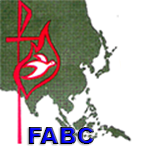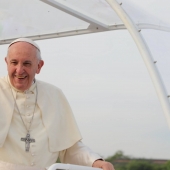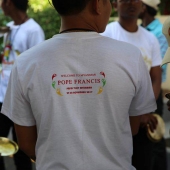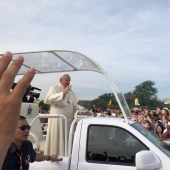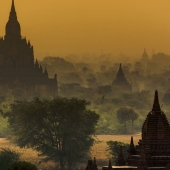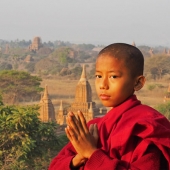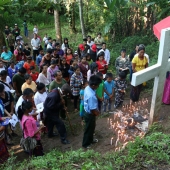Myanmar, also known as Burma, was a monarchy ruled by various dynasties prior to the 19th century. From 1885 until 1948, Myanmar was ruled as British colony but only the Bamar heartland was directly administered, first as a part of India and then, from 1937, as British Burma. Ethnic regions outside the heartland were allowed some measures of self-rule along the lines of the Princely States of India and this led to split loyalties among the various ethnic groups to outside powers in Burma. There are more than 135 different ethnic groups in Burma, each with its own history, culture and language. The majority Burman (Bamar) ethnic group makes up about two-thirds of the population and controls the military and the government. On 4 January 1948, Burma was granted its independence from Great Britain and the British government gave the new ruler to control over areas that were not traditionally controlled by the Bamar. From the time of the signing of the Burmese Constitution in 1948, ethnic minorities have been denied of their Constitutional rights and have been consistently oppressed and suffered by the dominant Burman majority, warlords and regional ethnic alliances. Muslims, Hindus, Christians and Buddhists all live in Burma and religion also plays a role in the ethnic conflicts and have led to several incidents up until today.
19 July 1947, political rivals assassinated Aung San and his several cabinet members and on 4 January 1948, the nation became an independent republic, named the Union of Burma, with Sao Shwe Thaik as its first President and U Nu as its first Prime Minister. A bicameral parliament was formed, consisting of a Chamber of Deputies and a Chamber of Nationalities. In 1960, U Nu party faction won decisive victory in elections, but his promotion of Buddhism as the state religion and his tolerance of separatism angered the military and U Nu faction was ousted by military coup led by Gen. Ne Win in 1962. Ne Win abolished the federal system and inaugurated “the Burmese way to Socialism”-nationalizing the economy and practiced economic isolation, forming a single-party state with the Socialist Programme Party as the sole political party, banning independent newspapers, Church and privately run hospitals, schools and deported foreign missionaries and any persons foreign to the country.
There were sporadic protests against military rule during the Ne Win years and these were almost always violently suppressed. In 1974, new constitution came into effect, transferring power from the armed forces to a People’s Assembly headed by Ne Win and other former military leaders. 1981, Ne Win relinquished the presidency to San Yu, a retired general, but he continued as chairmen of the ruling Socialist Programme Party. Currency devaluation in 1987 wiped out many people’s savings and that triggered many anti-government riots and thousands of people were killed. The State Law and Order Restoration Council (SLORC) is formed in 1988 and the following year SLORC declared Martial Law and thousands were arrested including Aung San Su Kyi. General election was held in 1990 and the opposition party of Aung San Su Kyi “National League for Democracy (NLD)” won landslide but ignored by the military. In 1991, Aung San Su Kyi is awarded for Nobel Peace Prize for her commitment to peaceful change and 1997 Burma is admitted to the Association of South East Asian Nations (ASEAN). SLORC renamed their government to State Peace and Development Council (SPDC).
2003 August, Khin Nyunt became prime minister and he proposed to hold convention in 2004 on drafting new constitution as part of “road map” to democracy. 2005 November, seat of government is moved to Nay Pyi Taw from Yangon City. 2008 April government publishes proposed new constitution, which includes allocating a quarter of seats in parliament to the military and bans opposition leader Aung san Su Kyi from holding office. 2008 May, Referendum on new constitution proceeds amid humanitarian crisis following the “Cyclone Nargis” which killed around 134,000 in low-lying and densely populated Irrawaddy delta, and government says 92% voted in favor. 2010 October, Government changes country’s flag, national anthem and official name from Burma to Myanmar. 2010 November, Main military–backed party, the Union Solidarity and Development Party (USDP) claims resounding victory but opposition groups allege widespread fraud and election is widely condemned as a sham. The junta says the election marks the transition from military rule to a civilian democracy and 2011 March, Thein Sein (ex. General) is sworn in as president of a new, nominally civilian government. 2012 President Thein Sein sets up commission to investigate violence between Rakhine Buddhists and Rohingya Muslims in the west, in which dozens have died. 2012 January Government signs ceasefire with Karen ethnic group (one of the world’s longest-running civil conflicts) and March 2015 after more than 60 years of armed conflict, the government of Myanmar and 16 ethnic rebel groups signed a draft ceasefire agreement. 2015 November, opposition National League for Democracy – led by Aung San Su Kyi wins enough seats in parliamentary elections to form a government and in 2016 March, U Htin Kyaw sworn in as president after 50 years of military domination. Aung San Suu Kyi was constitutionally barred from becoming President and a position called State Counselor, similar to Prime Minister, was established for her on 6 April 2016.
In March 2017 the Parliament of Myanmar approved a proposal by the Holy See (the universal government of the Catholic Church) to establish diplomatic relations between two nations and the announcement was made after a meeting between Pope Francis (the Head of universal Catholic Church and the Head of Vatican City State) and Aung San Su Kyi (the de facto leader of Myanmar’s civilian government and also its Foreign Minister) at the Vatican City on May 4, 2017. Myanmar thus becomes the 183rd country to establish diplomatic relations with the Holy See and on October 11, 2017 H.E. Archbishop Paul Tschang In-Nam, the newly-accredited Apostolic Nuncio of the Holy See to the Republic of the Union of Myanmar, presented his Letter of Credence to President U Htin Kyaw at Presidential Palace, Nay Pyi Taw. It has been reported that Pope Francis will become the first pontiff to visit Myanmar in November 2017, after being personally invited by Myanmar President Htin Kyaw.
Myanmar presently is a unitary parliamentary republic under its 2008 constitution written by the military government and the military junta still controls the security forces, the police and key cabinet positions in the government. Mr. Simon Lewis of TIME Magazine wrote in his article on “5 Challenges Facing Burma's New Civilian Government” stated the (5) challenges like broken economy, failed ceasefire with major ethnic groups, the drug problem, issue of an unwanted people like Burma doesn't recognize the Rohingya as its citizens, contending that they are illegal migrants from Bangladesh and inherited oppression of locking up a new generation of activists for expressing political views.
Power over the military rests with the commander-in-chief who has complete control over Myanmar's security and police forces and Military has been at the helm of "clearance operations" in Rakhine state, sending hundreds of thousands of Rohingya Muslims out of Myanmar border. For that, Aung san Su Kyi has been the focus of the world's criticism, scrutiny and censure as hundreds of thousands of Rohingya Muslims seek refuge in neighboring Bangladesh, escaping what the United Nations human rights chief has labeled a "textbook example of ethnic cleansing."
When she addressed diplomats in Myanmar on September 19, Suu Kyi stressed that her government was still young -- in power for a mere 18 months -- and efforts to bring democracy to the country were still fledgling."After half a century or more of authoritarian rule, now we are in the process of nurturing our nation," she said. "We are a young and fragile country facing many problems, but we have to cope with them all. We cannot just concentrate on the few." (Source: edition.cnn.com)
Sources: Wikipedia,
BBC News (http://www.bbc.com/news/world-asia-pacific-12992883),
http://time.com/4275928/burma-myanmar-civilian-government-challenges/
Myanmar's military: The power Aung San Suu Kyi can't control by Jamie Tarabay, CNN <edition.cnn.com>

